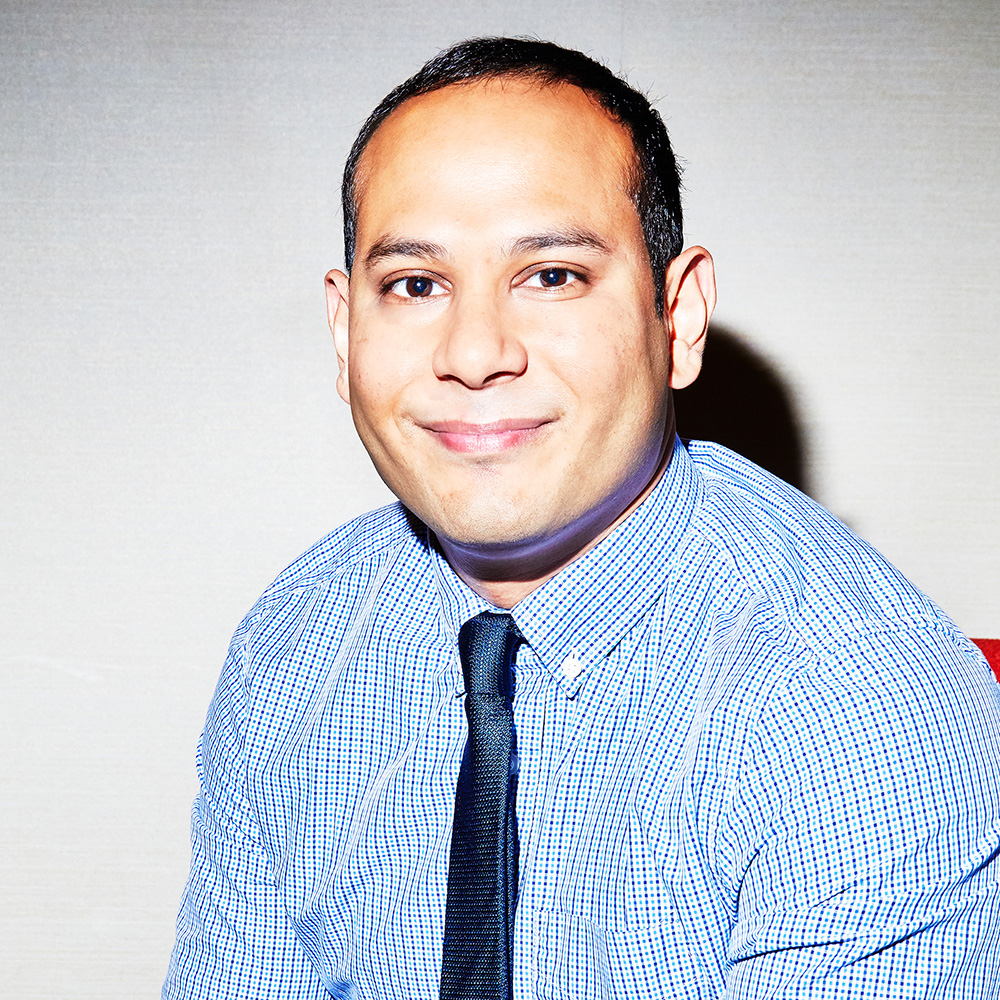The Winners
1. Best Twitter Thread
Winner: Grist
On Climate Change
Grist, a Seattle-based non-profit news organization, formatted its winning Twitter thread about climate change like a choose-your-own-adventure. The lead in this tweet, published October 30, 2020, is succinct but compelling: “We don’t have a time machine. So, we talked to historians, political scientists, & beltway insiders to help imagine how #ElectionDay results might shape climate policy.” One thread leads down the path in which Donald Trump wins the election; the other, if Joe Biden secures the presidency. The device illustrated how vastly different climate outcomes can play out depending on who becomes President, as well as the implications of party-control in the Senate and House.
Honorable Mention: George Hale
Reporting on Federal Executions
George Hale’s reporting on Alfred Bourgeois’ December 2020 execution by lethal injection is a powerful and moving account. As a reporter covering federal executions for NPR’s member station WFIU, Hale has witnessed numerous injections involving the use of pentobarbital, but Bourgeois’ death was, as he put it, “objectively worse.” The short format of these tweets allow the reader to process each horrific moment; the brevity lends a tone of gravity and respect. He closes the thread by saying, “That Alfred Bourgeois spent his final moments alive trying to convince me of his innocence is not something I’ll soon forget.”
2. Best TikTok Explainer
Winner: Abbie Richards
@tofology
Abbie Richards’s videos approach tough, controversial topics with wry wit and a truly charming lack of pretension. She explores QAnon, climate change, and fake news, among other subjects, and films herself informally, often drinking tea, or dressing up like characters including a cruise ship passenger and a cable TV executive. Her approachable, often hilarious explainers skewer politicians and media personalities who she perceives as spreading misinformation.
Honorable Mention: Lisa Remillard
@lisaremillard
Lisa Remillard is a veteran journalist and TV personality who has taken to TikTok to break down the latest political news into digestible tidbits. In her “Fast Facts” videos, she distills the details of a major daily story- whether it’s stimulus payments, vaccines, or the Georgia run-off election – into 60-second fast-talking sprints. Remillard’s direct approach and infectious energy has helped draw in over one million followers.
3. Best Use of Public Records
Winner: “The Bad Cops: How Minneapolis protects its worst police officers until it’s too late.”
Minnesota Reformer
Six months before the death of George Floyd at the hands of a Minneapolis police officer, reporters Tony Webster and Max Nesterak, who our judges called “highly skilled at public records requests and relentless in their journalism,” requested all disciplinary records for Minnesota’s roughly 800 police officers – but it took a lawsuit to get even a fraction of what they sought. In their article, Webster and Nesterak write: “The Minnesota Police Department is notoriously ineffective at removing bad cops from its ranks,” and their reporting revealed “a department that is slow to address accusations of abuse, often taking years to mete out a letter of reprimand or week’s suspension without retraining or other corrective actions.” This story tells the larger story of the lack of accountability for police and the individual stories of people assaulted or otherwise mistreated by police. An essential piece of journalism, especially as the world watched the lead-up to the trial of Derek Chauvin.
4. Best News-Based Podcast
Winner: You’re Wrong About
In their podcast, “You’re Wrong About,” journalists Michael Hobbes and Sarah Marshall “reconsider an event, person or phenomenon that’s been miscast in the public imagination.” Each episode is not only well-researched and deeply reported but engages listeners with the banter and chemistry of two charismatic personalities. Hobbes and Marshall discuss a range of topics and historical events with intelligence, insight, humor, and nuance. Listeners have said the show has made them more empathetic, thoughtful, and informed, while making the pandemic a little more “bearable.” Popular episodes include series on the D.C. snipers, the OJ Simpson trial, Princess Diana, and the Newsboys’ Strike of 1899.
Honorable Mention: Outsiders
The Seattle-based NPR station KNKX and The Seattle Times joined forces to tell a cinematic story chronicling the rise of the unsheltered on the West Coast and efforts to fight it. The series dispenses with the tropes of reporting on poverty — the one-dimensional criminals and victims, the “exceptional poor” — and instead, immerses listeners in a nuanced, higher-resolution picture of people experiencing homelessness.
5. Best Non-Profit News Source
Winner: The Trace
The Trace is a newsroom dedicated to reporting on all the ways that guns impact American life. Their stories focus on everything from new research on harm reduction, to in-depth discussions of gun laws, to the power of the NRA and gun manufacturers, to law enforcement and community violence, and much more. In their 2020 series “Coronavirus & Guns,” The Trace brought attention to specific firearm issues that unfolded in response to the pandemic. The easily readable site includes feature stories, breaking news, Q&A’s, an “Ask the Trace” series, and a daily bulletin.
Honorable Mention: The 19th
Created in honor of the 19th Amendment which gave women the right to vote, The 19th is an independent newsroom that covers stories of particular importance to women, including the intersection of gender, politics, and policy. Their “On the Rise” collection profiles powerful women, people of color, and members of the LGBTQ+ community. The asterisk in their logo serves as a reminder that the 19th Amendment remains unfinished as there are still groups prohibited from being equal participants in our democracy. This team is on a mission to bridge that gap through meaningful reporting and community building.
6. Best Solo Newsletter
Winner: Letters From an American
Heather Cox Richardson
Boston College professor Heather Cox Richardson’s Substack explores daily news stories through insightful, no-nonsense narrative essays chock full of data and layered with historical context. Richardson makes her mark with her deep knowledge and by breaking away from the popular “quick hits” and showing her work with extensive links for further reading.
Honorable Mention: Posse Comitatus
Jessica Pishko
Jessica Pishko’s Substack focuses on investigating and reporting on sheriff’s departments around the country. Pishko, a Dallas-based lawyer and social justice writer, digs into corruption, racism, mass shootings, immigration and more. Her prose style is conversational, and the posts are deeply reported. Pishko writes about breaking news, but also digs deep into history to give readers greater insight into America’s fractured law enforcement apparatus.
7. Best Non-Traditional News Source
Winner: Economic Hardship Reporting Project
The Economic Hardship Reporting Project is devoted to supporting the work of journalists who report on all aspects of poverty and economic insecurity. The project helps fund and co-publish stories in partnership with major news outlets in order to get these stories into publications that don’t typically cover poverty. Journalists working with the EHRP contribute personal narratives, photo essays, documentary films, illustrations, and podcasts. Commissions help tell the human story of financial instability by looking at families, health, criminal justice, housing, and more. This project also aims to give voice to journalists from underrepresented communities.
Honorable Mention: Open Secrets
OpenSecrets is run by the nonpartisan, nonprofit Center for Responsive Politics and is perhaps best known for its expansive databases of money in politics, such as campaign contribution and lobbying records and analyses. But in addition to the invaluable tools their research provides to journalists, the site also publishes original reporting that looks at the news through the lens of political financing, both domestic and international.
8. Best Data Visualization
Winner: The COVID Tracking Project
The Atlantic
One of our judges called it a “stunning display of citizen journalism” which will “inform reporting for years to come.” Atlantic’s COVID tracking project (CTP) was largely produced by hundreds of volunteers, including journalists, research scientists, data analysts, and community organizers. In its quest for the most comprehensive data possible, CTP developed “wings” of the project, including the COVID Racial Data Tracker and the Long-Term-Care Data Tracker. The study was cited in over 900 academic papers and 7,500 news articles and used by both White House administrations, federal agencies like the CDC and FEMA, and state and local policymakers.
9. Most Likely to Inspire Young Journalists
Winner: Meet the Investigators Series
International Consortium of Investigative Journalists
This collection of interviews is a window into the work and experiences of award-winning investigative reporters. Truly a global contribution, the Meet the Investigation Series debuted in April 2018 with journalist Ritu Sarin from India and has since featured reporters from all over the world–from Brazil to Botswana, Peru to Pakistan, Korea to Indonesia. Featured journalists discuss a broad range of work aimed at promoting social justice, corporate accountability, press freedoms, and harnessing power for the people.
10. Best Debunking of Fake News
Winner: Rachel Greenspan of Insider
For her work on QAnon
Rachel Greenspan of Insider reports on disinformation, far-right extremism, and the “dark side of the internet.” Formerly an internet culture reporter for TIME, Greenspan has become an expert on the beat of misinformation and conspiracy. Her winning body of work consists of in-depth analysis, deconstructing the power and extent of Q’s influence. Some of Greenspan’s most read pieces include: how QAnon helped fuel the January 6 insurrection, how it builds on centuries of anti-Semitism to spread conspiracies, and how the Q conspiracy used the internet to target audiences via lifestyle influencers and the harassment of celebrities.
Eyewitness Award
Given to a private citizen whose actions embody the journalistic value of bearing witness
Winner: Darnella Frazier
When she saw George Floyd being arrested, 17-year-old Frazier started filming, and she didn’t stop. Her video sparked international outrage, leading to mass protests around the globe. Her video and testimony were key pieces of evidence in the trial that found Minnesota police officer Derek Chauvin guilty of murder and manslaughter in Floyd’s death. Frazier exemplifies the best of citizen journalism, bearing witness and documenting events, and, we hope, ultimately leading to a better world.
Reporting on Race Award
Winner: Errin Haines
Haines is a founder of The 19th, a non-profit news organization dedicated to reporting on news of particular interest to women. In 2020, Haines’s work examined the year’s two biggest stories – Covid-19 and the election – by looking at their impact on women of color, including voters in Minneapolis and workers in Philadelphia. By telling these stories, Haines’ provides us all with a deeper view of American life.
The Judges

Madeleine Baran
Investigative reporter for APM Reports and the host and lead reporter of the podcast In the Dark. Baran is the recipient of awards including the Alfred I. duPont-Columbia Award, the George Polk Award, and the George Foster Peabody Award.

Sopan Deb
A New York Times writer and author, Deb has been the recipient of an Edward R. Murrow Award and was named a “breakout media star” by Politico.

Adam Penenberg
Journalism professor at NYU and founder and director of the American Journalism Online master’s program.

Wendi Thomas
The founding editor and publisher of MLK 50: Justice Through Journalism, a distinguished fellow in ProPublica’s Local Reporting Network, and the winner of multiple awards including the Selden Ring Award for investigative reporting and the National Association of Black Journalists Best Practices Award.